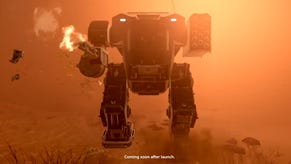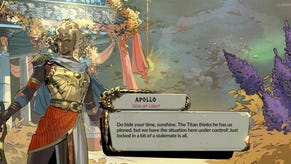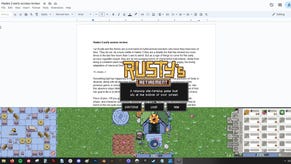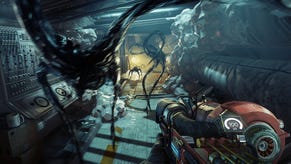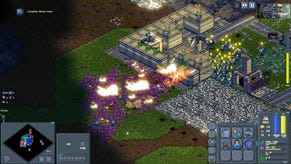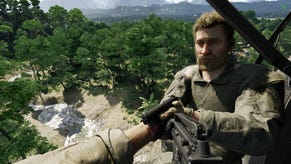The devs of surreal escape sim Militsioner explain how they've shrunk their giant ambition
TallBoys cut their voice recognition feature and added a tutorial
Could there be a more than universally relatable quote shared by indie developers than: "We really just wanted to make a small game"? Of course, there's little to complain about when games like Cuphead or Owlboy finally see the light of the day, demonstrating what wonders growing ambition can often bring.
Having said that, I’m not entirely surprised that Vladimir Semenets, the lead game designer of Militsioner, sits in front of me on Zoom and tells me how they initially envisioned a six-month project, "something very fast". Yet, here we are, three years and more than a dozen developer vlogs since TallBoys' surreal runaway sim first captured everyone's attention (including one state-owned Russian news channel). If not for its Kafkaesque premise, which pits players against a ten-story tall looming policeman in a quest to escape a small town, then definitely because of the game’s ambitious voice recognition feature that promised real-time conversation instead of pre-written dialogue.
After that, TallBoys went silently into the night, occasionally releasing behind-the-scenes progress videos on their YouTube channel to a humble yet dedicated fanbase. That is, until the end of last year, when Militsioner returned to the public eye as part of Day Of The Devs' showcase to demonstrate how much this Orwellian "dating sim", as they like to joke, has changed since the last time we were reprimanded by the Brobdingnagian policeman.
As soon as you open Militsioner's demo, which I was lucky enough to get my hands on, you are given a brief run-through of all the tricks you can use to escape the all-seeing eye. Besides the classics, like throwing bricks at cars to distract your captor while you skedaddle towards the exit, players also learn how to get on the Militsioner's good side by plying him with compliments ("You're a radiant soul!") and gifts. Make him happy and you're rewarded with a black-and-white close-up shot of the giant's grinning face. Upset him and prepare to be plucked away by his mammoth hand, before having to explain yourself.
While this optional tutorial feels like a great way to introduce newcomers to the basics of stealth sims, TallBoys admit that wasn't why it was added. "Some testers completely ignored the Militsioner and most of the mechanics, like the time system, that we spent a lot of time to make. It felt like they were playing someone else's game," Dmitry Shevchenko, Militsioner's game designer and the head of studio operations, explains, and promises that all of this tutorialising will be naturally eased into the final game. He says the team "spent months trying to understand what we really needed" for the tutorial, adding that they all admire the masterclass way Nintendo "introduce complex mechanics so effortlessly" in modern The Legend Of Zelda titles.
On my first attempt to catch the train leaving the depressing, ghostly town that forms the setting for the game, I befriended a stranger who was craving a cigarette. After learning how the pawnshop works, and scraping together enough rubles to buy a pack of cowboy killers for the nicotine-hungry fella, I was rewarded a key to the smoker's tenement for my trouble. This allowed me to bypass the ticket booth, by parkouring a couple of roofs under the cover of the night – when Militsioner is sound asleep. There, I found a ladder to a platform perched directly above the train tracks.
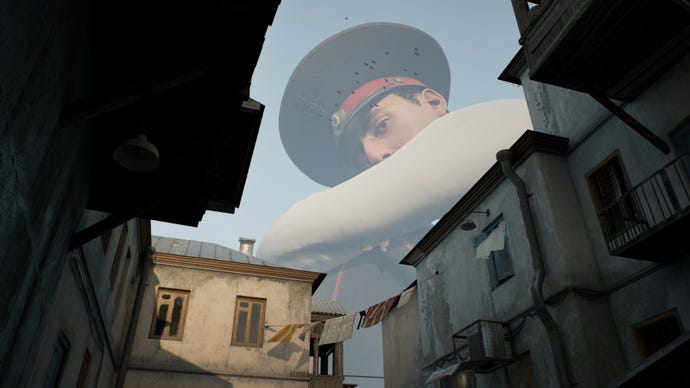
If all this sounds a bit like planning an execution as Agent 47, it's not far from the truth, as that's exactly the feeling TallBoys were aiming for. Semenets says that the Hitman games were one of the biggest inspirations for Militsioner, also citing the Dishonored series. "They play like immersive sims: there’s an open map which allows the player to explore different ways and approaches to reach their goal. We tried to model escaping in Militsioner as if it was elimination in Hitman games," he tells me.
If my first attempt to leave this God-forsaken town behind was to be compared with executing an assassination, by the end of it I'd be spending the foreseeable future behind bars in a freezing Siberian gulag. As the train rolled into view, I made my way to the platform above it, which allowed me to do the Leap of Faith into a pile of leaves conveniently located on its roof. I thought I was a free man, but as soon as I hit the train's leafy rooftop, I respawned right at the start of the level. While such bug-related setbacks aren't unexpected given Militsioner's alpha status, that didn't stop the train from departing and leaving me for a date with the face of authority.
After spending more than two hours trying to please this Leviathan-sized Russian cop while trying new ways to escape his regime, I felt Stockholm syndrome was beginning to take hold. I wanted freedom, sure, but every time Militsioner caught me and interrogated me about the weirdos I met in the village (without spoiling too much, Zelda fans will be delighted with a nod to one of Majora's Mask's strangest characters), I couldn't help but feel like his stoic facade was starting to loosen up. Him being the titular character, it only makes sense that players get to know their captor's whole deal.
"For the narrative of Militsioner to work, you will be playing as different characters," Semenets explains. "It wouldn't work if you escape and snap right back into it. Not only will this change the approach of him catching you as a criminal, but the dynamic between him and the player." While TallBoys didn't say how many different escape scenarios we're talking about for the final game, they were happy to share what overarching story lies behind this Kafkaesque Groundhog Day.
"The story idea is that Militsioner is pushing the ground downward so the town is getting flooded. He's flooding himself, but he wants to retain his power," Semenets says before Nikita K., the game's composer and animator, takes over: "Our game is basically about choosing between escaping or not. Every citizen should answer this question [of] why he chooses to escape or not. Militsioner will explain why he doesn't escape, why he sits on the ground and creates this deep pit that slowly gets flooded. That’s the moral dilemma we try to explore more in our game." Deep, yes, but at the same time, very Dostoevsky-esque.
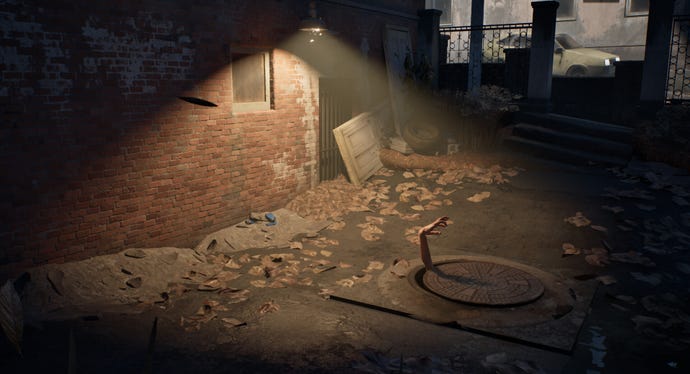
Only a few studios have as much first-hand experience in escaping as TallBoys. After all, in their last developer vlog they revealed that part of the team had to flee their homes in Russia, due to numerous repressive policies targeting any "anti-military stance [that] can result in lengthy prison terms."
When asked where the team's fascination with fleeing comes from - a motif evident in both of the studio's previous games - Shevchenko likened every TallBoys project to a therapeutic memento. "With Where the Clouds End, for example, we wanted to express our tiredness, being burnt out. Where with Pandemic Express, we explored some form of escaping and trying to find something new," he says. "In Militsioner we’re trying to describe a real situation."
If you've been following Militsioner since its infancy, one of the main changes you'll notice is that voice recognition, one of the project's central hooks when it was revealed, is no longer present. All the talking in the game is now done not by using the mic, but by selecting from fairly limited options ("it's not perfect right now and there will be a lot of changes in this aspect"). It's a reactive dialogue system that most Firewatch players will be familiar with.
While I was intrigued by the idea of sweet-talking your way out of punishment, you know, like you'd normally do after being pulled over for going a tad too fast, Semenets said ditching the voice recognition was the only way we'd ever see Militsioner reaching the finish line - which was already way overdue. "We felt like we were stagnating. There was a point where we were developing Militsioner and felt like we're just getting cornered with this mechanic," he says, with a heavy sigh. "It conflicted with a lot of input from the players. For example, not everyone has a microphone. We had to make different ways to enter commands. You would need to have a keyboard or maybe a controller, and typing with the controller is just painful."
Of course, the team tried to catch the thunder by implementing ChatGPT (version 2.0), the hottest thing in the tech world, even before most of us knew its name - or just how lacklustre AI's integration into the industry would prove to be. "We spent months trying to wrap our minds around how we want to implement it. It was a lot of guesswork [and] a huge amount of work," Semenets says. In the end, the tech was too advanced, and advancing too fast, to be worth the trouble.
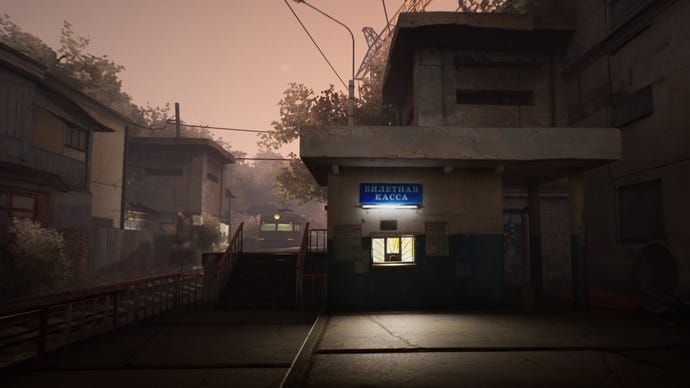
And so was the voice recognition function - a Herculean feat only recently tackled by infinitely-pocketed Nvidia during its eyebrow-raising CES demonstration. "One day we just discussed the idea that maybe we should just drop it. 'Maybe we don't want to waste another year on making it,'" Semenets remembers, calling it one of the most painful decisions during Militsioner's development. "I really liked the idea that you can speak freely in a game that doesn't care about your freedom of speech. It's a cool idea, but it was simply too much work."
For a studio that has been forced to flee its home and scale down its Brobdingnagian vision stuck in a development hamster wheel, I was expecting more regretful, world-weary sighs. But in fact, all three TallBoys' members radiate the energy of a game dev on the brink of a breakthrough. Does that mean the finish line is on the horizon?
"We do have a deadline actually," Shevchenko promises. "At the beginning, we felt like we were relaxed in our development - there were deadlines but they were really soft. It was as if we were making this game for fun." Naturally, Shevchenko and Semenets are playing coy about Militsioner's release date, only hinting that it might take about 10 hours to beat, based on players' experience with similar games.
After spending the better part of the demo toying around with Militsioner's world, testing how reactive this Orwellian toybox is, it's not difficult to see why TallBoys are not in a rush to make any big announcements. You can play it like a shameless criminal, smashing the ticket booth's window with a brick, snatching the ticket and making a run for it, before (verbally) flipping off the giant. Or you can play along, interacting with its wacky characters and collecting hints about Militsioner's delicate sleeping patterns.
With the addition of a few more missions, some new dialogue lines to compliment the policeman's uniform, and Militsioner's tweaked morality system - which is currently fairly rudimentary - TallBoys might have something big enough to compete with the immersive sim giants.
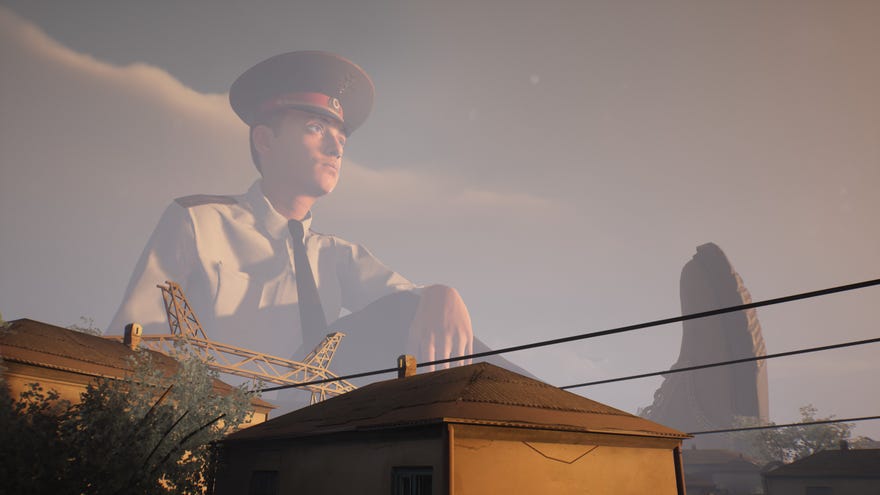
.jpg?width=70&height=70&fit=crop&quality=60&format=png&auto=webp)
